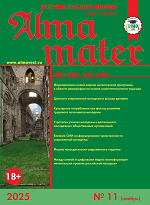https://doi.org/10.20339/AM.11-17.046
E.V. Taptygina is Cand.Sci. (Medicine), head of department — centre of simulation technologies at Krasnoyarsk State Medical University n.a. prof. V.F. Voyno-Yasenetsky e-mail: taptygina@mail.ru
Examined is the system of formation of professional competence of students of medical faculties. Presented is experience of using simulation technologies in the learning process and at the stage of certifications, as well as shown is application of information technologies to ensure reliability of estimation of the level of formation of professional competences of the graduate. Also shown is example of contest of practical skills for ensuring emergency and urgent medical ambulance help, format of which allows to determine the level of readiness of students to professional activity. Analyzed is the order of getting the right for conducting medical practice after receiving higher medical education.
Key words: medical education, competencies, work practice, certification, checklist, accreditation, simulation training.
References
1. Shynkar, O.V. The estimation and comparative analysis of universal competences of graduating students of medical and stomatological faculties. Znanie. 2016, no. 2-2 (31), pp. 159–161.
2. Khan, K., Pattison, T., Sherwood, M. Simulation in medical education. Med. Teach. 2011, no. 1, pp. 1–3.
3. Turchinа, J.E., Sharova, O.I., Nor, O.V., Cheremisina, А.А., Bitkovskaya, V.G. Simulation training, modern educational technology in practical training of students of junior courses of medical school. Modern problems of science and education. 2016, no. 3, p. 308.
4. Shelkovnikova, S.G., Morozov, A.N., Chirkova, N.V., Koretskaya, I.V. The role of practice in training internship doctor. Medical Scientific Bulletin of Central Chernozemye. 2016, no. 64, pp. 120–123.
5. Morozov, A.N., Shelkovnikova, S.G., Chirkova, N.V., Koretskaya, I.V. Competency building approach in professional training of medical interns. Medicus. 2016, no. 3 (9), pp. 138–139.
6. Shaposhnikova, E.V., Maiseenko, D.A., Egorova, A.T., Galaktionova, M.Yu. Experience in the use of “checklists” to assess the implementation of professional skills in obstetrics. Alma mater (Vestnik vysshei shkoly). 2016, no. 8, pp. 109–112. DOI: 10.20339/AM.08-16.109.
7. Ohta, K., Kurosawa, H., Shiima, Y., Ikeyama, T., Scott, J., Hayes, S., Gould, M., Buchanan, N., Nadkarni, V., Nishisaki, A. The Effectiveness of Remote Facilitation in Simulation-Based Pediatric Resuscitation Training for Medical Students. Pediatr. Emerg. Care. [Epub ahead of print].
8. Shtegman, O.A., Taptygina, E.V., Nikulina, S.Yu. Experience of control level of development of practical skills on state final examination. In: Modern trends of development of pedagogical technologies in medical education. Krasnoyarsk, 2015, pp. 422–424.
9. Popov, A.I., Rakitina, E.A. The Olympics as a tool for developing the creative cultural competences of the specialists and the assessment of the level of their formation. Alma mater (Vestnik vysshei shkoly). 2016, no. 1, pp. 71–75. DOI: 10.20339/AM.01-16.071.
10. Artyukhov, I.P., Taptygina, E.V. Accreditation of medical specialists. In: Modern trends of development of pedagogical technologies in medical education. Krasnoyarsk, 2016, pp. 373–374.
11. Order of the Ministry of Health of the RF “On approval of the Regulation on the accreditation of specialists” (amended on December 20, 2016).
12. Bolotov, V.A., Navodnov, V.G., Pylin, V.V., Poryadina, O.V., Chernova, E.P. Federal Internet-exam for graduates of undergraduate program: areas of improvement and prospects of development. Higher education today. 2016, no. 11, pp. 4–11.











.png)






